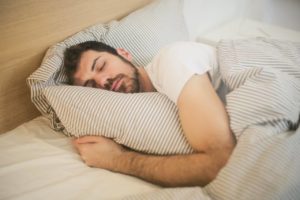In the never-ending rush and obligations of modern life, one aspect often overlooked is the importance of quality sleep and particularly how it affects sexual function – and dysfunction! in men. Regardless of what you think you can ‘get away with’, a minimum of 7-9 hours of sleep per night is recommended for adults.
While many people are aware of the effects of poor sleep on overall health (it can underlie chronic conditions such as heart disease, diabetes and high blood pressure), few people – including physicians – recognize the profound impact poor sleep can have on sexual function, and dysfunction, in men – and fertility!
The Importance of Quality Sleep
Quality sleep is a cornerstone of overall well-being, influencing physical, mental, and emotional health. During sleep, the body undergoes crucial processes such as hormone regulation, tissue repair, and memory consolidation. For men, one key aspect influenced by sleep is sexual function and fertility.
As we’ll explore in this article, obstructive sleep apnea – OSA – can be a major contributor to male sexual disorders.
What you may not know is just how prevalent OSA is. Here are some statistics:
- Obstructive sleep apnea is just one form of sleep disordered breathing (SDB). CDC research showed that 75% of adults have sleep disordered breathing symptoms. [1]
- It’s estimated that 39 million adults in the US have OSA (with up to 80% of them undiagnosed). [2]
- And a 2019 study found that as many as 936 million adults around the world have mild to severe OSA. [3]
- Snoring is a common symptom of OSA in up to 94% of patients. [4] Are you one of them?
Note: Obstructive sleep apnea is a SERIOUS HEALTH CONDITION that can lead to a number of chronic conditions such as hypertension, heart problems, diabetes, depression and even Alzheimer’s – as well as sexual dysfunction.
If you snore or suspect that you or a loved one may have OSA, please consult with a sleep specialist. Home sleep tests are available and can help avoid the expense of a hospital test. Some dentists (there are ‘sleep specialist’ dentists) offer home sleep studies, and can then refer you to a sleep specialist physician, based on the test results.
So what does sleep have to do with sex?
A LOT, as it turns out! This is especially true if you and your partner are trying to conceive, or you’re worried about erectile dysfunction (ED).

The Sleep-Sex Connection:
-
Hormonal Imbalance:
One of the key ways poor sleep affects sexual function is through hormonal imbalances that almost always affect multiple systems in the body – including the brain. Sleep deprivation can disrupt this delicate balance of hormones, such as testosterone, which plays a crucial role in male sexual health. Reduced testosterone levels can lead to a decline in libido, making it more challenging for men to get in the mood, as well as reduced sperm production, and increased infertility.
-
Disruption of Circadian Rhythms:
Because such hormone imbalances are commonly caused by sleep disorders, especially those that disrupt circadian rhythms (your body’s internal clock), proper sleep becomes even more pivotal. This sleep-wake cycle influences the secretion of hormones such as melatonin, which plays a role in regulating reproductive hormones like luteinizing hormone (LH) and follicle-stimulating hormone (FSH). In men, disruptions in these hormonal patterns can negatively affect sperm production. [7]
-
Temperature Regulation and Sperm Quality:
The testes require a slightly lower temperature than the rest of the body for optimal sperm production. Sleep disorders, especially those affecting thermoregulation, can elevate scrotal temperatures. Increased scrotal temperatures have been associated with impaired sperm quality and function, potentially contributing to male infertility.
-
Oxidative Stress and Sperm Damage:
Sleep disturbances can contribute to oxidative stress, a condition where there is an imbalance between free radicals and the body’s ability to neutralize them with antioxidants. Oxidative stress can damage sperm DNA and impair sperm function. Adequate sleep is crucial for maintaining a balanced antioxidant defense system, protecting sperm from oxidative damage.
-
Inflammation and Seminal Parameters:
Inflammatory Response: Chronic sleep disorders have been linked to systemic inflammation. Inflammation can negatively impact sperm production and maturation, as well as disrupt the overall composition of seminal fluid. In turn, these factors can influence sperm motility and fertilization potential.
-
Psychological Impact on Fertility:
Stress and Anxiety: Sleep disorders often coexist with stress and anxiety, which can further compound issues related to male fertility. Stress hormones, such as cortisol, may interfere with the normal hormonal signals governing reproductive function.
-
Erectile Dysfunction (ED):
Research suggests a strong correlation between insufficient sleep and the development of erectile dysfunction. Sleep-deprived individuals are more likely to experience difficulties achieving and maintaining an erection.
The relationship between sleep and erectile function is intricate, with sleep disorders like sleep apnea further complicating matters. [5]
(See more details on sleep apnea and sexual health, below) -
Lowered Sex Drive:
Libido, often referred to as sex drive, is intimately connected to sleep patterns. Poor sleep quality and/or chronic sleep deprivation can contribute to a diminished sex drive, leaving men feeling less interested in sexual activity. The fatigue and lack of energy associated with inadequate sleep can also dampen enthusiasm and hinder the emotional connection crucial for a satisfying sexual experience. Understanding this connection emphasizes the importance of prioritizing sleep for a healthy sex life. [6]
-
Interrupted Sleep Cycles:
Men experience several erections during the night as part of their natural sleep cycles. Disruptions in these cycles, often caused by poor sleep, can interfere with the body’s ability to regulate blood flow to the genital area, potentially leading to sexual difficulties.
-
Increased Stress and Anxiety:
Lack of sleep is a known contributor to stress and anxiety, both of which are significant factors in sexual dysfunction. Elevated stress levels can lead to performance anxiety, making it more challenging for men to achieve and maintain an erection.
A Look at How Sleep Apnea Specifically Affects Erectile Dysfunction:
-
Impact on Blood Flow:
Oxygen desaturation: Individuals with sleep apnea often experience drops in blood oxygen levels during apneic episodes. This oxygen desaturation can impair blood vessel function. This reduces the delivery of oxygen to tissues, including those in the genital area. The resulting compromised blood flow can contribute to erectile dysfunction.
-
Endothelial Dysfunction:
Vascular Health: Sleep apnea is associated with endothelial dysfunction, a condition where the lining of blood vessels doesn’t function optimally. This dysfunction can impair the ability of blood vessels to dilate, affecting blood flow. Healthy blood vessel function is critical for achieving and maintaining an erection.
-
Neurotransmitter Regulation:
Nitric oxide production: Sleep apnea can disrupt the production and regulation of nitric oxide, a neurotransmitter involved in the relaxation of smooth muscle cells in the blood vessels. Nitric oxide plays a crucial role in the process of achieving an erection, and its dysregulation can contribute to ED.
-
Sympathetic Nervous System Activation:
Sleep apnea often leads to an overactivation of the sympathetic nervous system, the part of the nervous system responsible for the “fight or flight” response. This heightened sympathetic activity can contribute to vasoconstriction (narrowing of blood vessels), which is detrimental to erectile function.
The Bidirectional Relationship – sleep and sexual dysfunction:
The relationship between sleep apnea and erectile dysfunction is bidirectional, meaning each condition can exacerbate the other. ED can contribute to sleep disturbances, creating a cycle of worsening symptoms.
This two-way relationship between sleep and ED is also multifaceted, involving hormonal, vascular, and neurological factors. Because addressing one condition often positively impacts the other, recognizing the interconnected nature of these conditions emphasizes the importance of a holistic approach to health. Thus, addressing sleep quality and breathing issues is pivotal to promoting overall well-being, including sexual health and function.
Individuals experiencing symptoms of either sleep apnea or ED should seek professional advice from an appropriately-trained medical sleep specialist, for diagnosis and management of both conditions. Effective treatment of both is crucial to improving overall health and restoring a satisfying and healthy sex life.

Practical Tips for Improved Sleep and Sexual Health
Now that we’ve explored the negative impact of poor sleep on sexual function, let’s discuss some practical tips to enhance sleep quality:
1. Establish a Consistent Sleep Schedule:
Going to bed and waking up at the same time every day helps regulate your circadian rhythm (your body’s internal clock), promoting better sleep quality.
2. Create a Relaxing Bedtime Routine:
Engage in calming activities before bedtime, such as reading a book, taking a warm bath, or practicing relaxation techniques to signal to your body that it’s time to wind down.
3. Limit Screen Time Before Bed:
The blue light emitted by electronic devices can interfere with the production of melatonin, a sleep-inducing hormone. Aim to reduce screen time at least an hour before bedtime. While many people have a TV screen in the bedroom, this is usually NOT a good idea. It not only produces blue light, but also poses a major distraction from an audio perspective. If you use an e-reader tablet, make sure its blue-light blocking feature is turned ON.
4. Optimize Your Sleep Environment:
Ensure your bedroom is conducive to sleep by keeping it dark, quiet, and cool. Invest in a high-quality comfortable mattress and pillows for optimal support.
5. Limit Stimulants Before Bed:
Minimize the intake of caffeine and nicotine in the hours leading up to bedtime, as these can interfere with the ability to fall asleep.
6. Address Sleep Disorders:
If you suspect a sleep disorder, such as sleep apnea or insomnia, seek professional help. Treating underlying sleep issues can significantly improve overall sleep quality and, consequently, sexual function and health, as well as overall health.
Conclusion:
In the quest for a satisfying and fulfilling sex life, it’s essential not to overlook the role that quality sleep plays in men’s sexual function and especially fertility. By understanding the intricate connections between sleep, hormones, and sexual health, men can take proactive steps to prioritize their sleep. This will foster overall well-being and a vibrant sex life. Seeing appropriate specialists to address poor sleep and especially sleep apnea is crucial to overall wellbeing. Remember, a good night’s sleep is not a luxury; it’s a crucial component of a healthy and happy life.
==========================
References:
[1] https://www.ncbi.nlm.nih.gov/pmc/articles/PMC7731454/
[2] https://www.cdc.gov/pcd/issues/2021/21_0305.htm
[3] https://www.thelancet.com/journals/lanres/article/PIIS2213-2600(19)30198-5/fulltext
[4] https://www.ncoa.org/adviser/sleep/sleep-apnea-statistics/
[5] https://www.auajournals.org/doi/10.1016/j.juro.2007.10.024
[6] https://link.springer.com/article/10.1007/s11325-014-1043-4
[7] https://jcircadianrhythms.com/articles/10.5334/jcr.190


